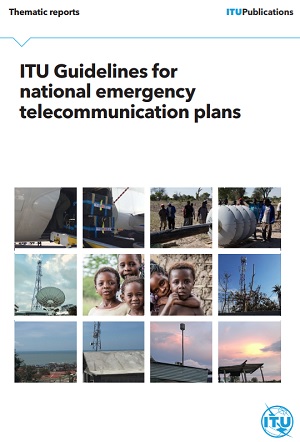In the face of the global COVID-19 crisis, as in any other emergency, the speed and efficiency of our response is proportional to the level of preparedness. To help countries better manage disaster response activities at a time when the frequency, intensity and human and economic impact of disasters is on the rise worldwide, the International Telecommunication Union (ITU) launches new guidelines for the development and implementation of national emergency telecommunication plans NETPs) and any other tailored contingency plans.
 | The ITU Guidelines are a critical tool to assist policy makers and national regulatory authorities to develop a clear, flexible and user-friendly national emergency telecommunications plan with a multi-stakeholder approach. The guidelines can be used for developing tailored contingency plans for emergencies caused by natural hazards, epidemics and pandemics. This includes national policies and procedures as well as governance to support and enable the continued use of reliable and resilient ICT networks, services and platforms for disaster management.
National Emergency Telecommunications Plans (NETPs) and tailored contingency plans, are an essential requirement to articulate a national strategy on using ICTs in the framework of disaster risk reduction.
|
The NETPs set out a strategy to enable and ensure communications availability during the disaster mitigation, preparedness, response and recovery phases, by promoting coordination across all levels of government, engaging stakeholders to think through the life cycle of a potential disaster, or any emergency, determining the required capabilities for emergency responses, and establishing a governance framework of roles and responsibilities. The Plan also clarifies how to shape planning, envision and share desired outcomes, and it outlines effective ways to achieve and communicate expected results. These procedures allow information sharing across all levels of government, within communities, and between public and private organizations to become more resilient to disasters.
For developing countries, the NETP highlights major areas of risk. This not only provides support and justification for the funding of vital equipment and personnel in an emergency, but also promotes the need for day-to-day resources and procedures that keep national authorities prepared, especially to maintaining vital communications, the essential lifeline during emergencies.
Emergency telecommunications and other information and Communication Technologies (ICTs) are critical for monitoring the underlying hazards and for delivering vital information to all stakeholders, including the most vulnerable societies at risk.
ITU has been providing assistance to countries in different regions to develop and implement national plans and strategies such as the NETPs. Until the first semester of 2024, the ITU has supported the development of 37 NETPs for countries in various regions, and is in the process of preparing 30 more, whether planned or currently under development.
| NETP approved/validated by the country | NETP finalized and sent for approval/validation | NETP under development | NETP planned
|
| Samoa | Fiji | Afghanistan | Antigua and Barbuda
|
| Commonwealth of Dominica | Kiribati | Nepal | Barbados
|
| Ecuador | Mongolia | Tonga | Cabo Verde
|
| Somalia | PNG | Tuvalu | Equatorial Guinea
|
| Sudan | Solomon Islands | Vanuatu | Guinea
|
| Malawi | Grenada | Bolivia | Sao Tome and Principe
|
SADC (16 countries):
Angola
Botswana
Comoros
Democratic Republic of Congo
Eswatini
Lesotho
Madagascar
Malawi
Mauritius
Mozambique
Namibia
Seychelles
South Africa
Tanzania
Zambia
Zimbabwe
| Paraguay
| Dominican Republic | Jamaica
|
| Peru | Guatemala |
|
| Saint Lucia | Iraq |
| Saint Vincent and the Grenadines | Djibouti |
| St. Kitts & Nevis | Mauritania |
| Palestine | Libya |
| Rwanda | English-speaking African countries (11 countries):
Gambia
Ghana
Nigeria
Liberia
Sierra Leone
Kenya
Angola
Equatorial Guinea
Guinea
Sao Thome
Cape Verde |
| Moldova |
|
| Georgia |
22
| 15
| 23
| 7
|
